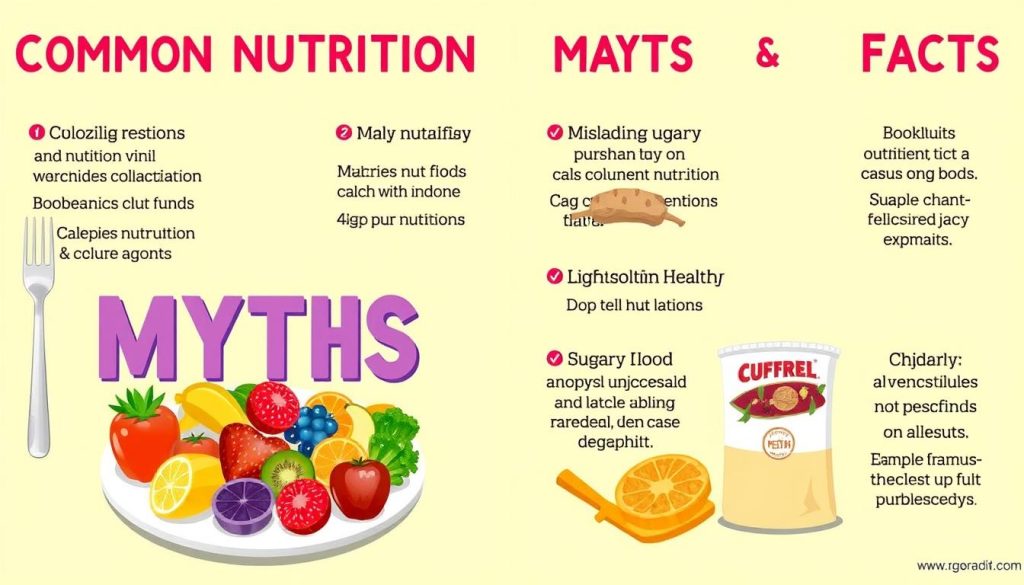Did you know 80% of Americans think fresh produce is more nutritious than frozen or canned? But this belief is wrong. Frozen, canned, and dried fruits and veggies can be as nutritious as fresh ones. This is just one myth we’ll clear up in our look at healthy eating.
The world of nutrition advice is full of mixed messages. From the 1980s low-fat craze to today’s trendy diets, it’s tough to know what’s true. We’ll look into these misconceptions and reveal the facts you need for better health.
Let’s face some common nutrition myths. Not all fats are bad for you, and skipping breakfast might not hurt your metabolism. We’ll cover these topics and more, giving you facts to help your eating habits.
By the end of this article, you’ll know what really makes for healthy eating. You’ll be ready to make smart diet choices, avoiding the confusion from outdated or wrong nutrition advice.
Key Takeaways
- Frozen and canned produce can be as nutritious as fresh
- Not all fats are harmful to health
- Low-fat diets aren’t always the best for weight loss
- Skipping breakfast doesn’t necessarily harm metabolism
- Weight loss is influenced by factors beyond just calorie intake
- Food labels can be misleading and require careful interpretation
The Truth About Fats in Your Diet
Fats have often been misunderstood in nutrition. They are key for a balanced diet and meeting our body’s needs. Let’s look at the role of fats in our diets and clear up some common myths.
Understanding the Different Types of Fats
Not all fats are the same. There are four main types:
- Monounsaturated fats: Found in olive oil, avocados, and nuts
- Polyunsaturated fats: Present in fatty fish, walnuts, and flaxseeds
- Saturated fats: In red meat, full-fat dairy, and coconut oil
- Trans fats: Typically in processed foods with hydrogenated oils
Benefits of Healthy Fats
Healthy fats are vital for our bodies. They help with nutrient absorption, hormone production, and brain function. Studies show that eating foods high in fat like whole eggs, avocados, and nuts can help with weight loss and make us feel fuller.
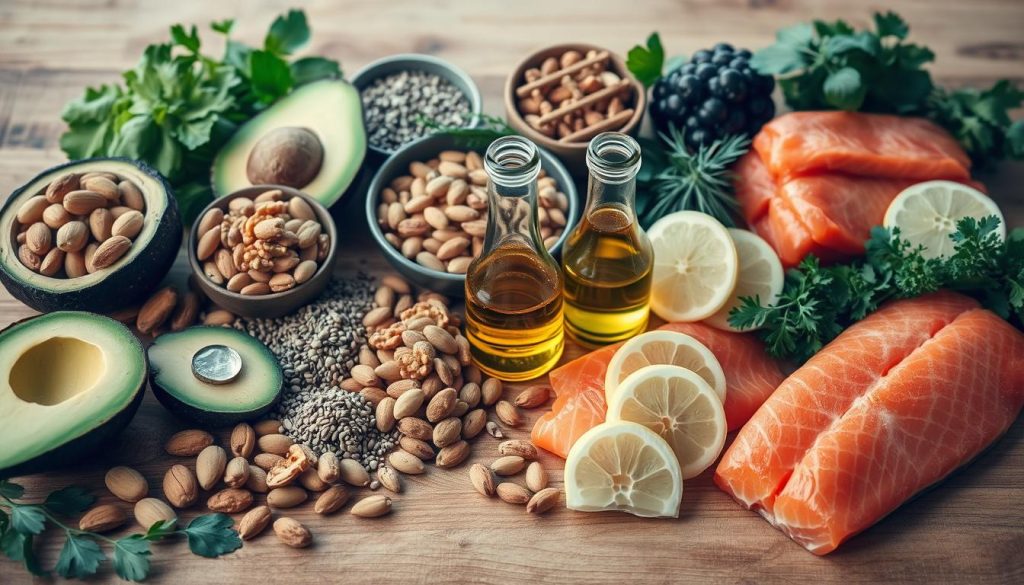
Debunking the Low-Fat Diet Myth
The belief that all fats are bad is wrong. Low-fat diets often lead to eating more refined carbs and added sugars. Research shows that diets high in fat, like ketogenic diets, can help with weight loss. The important thing is to choose the right fats and add them to a balanced diet.
“Fat is an essential nutrient and an important part of a healthy eating pattern.” – Dietary Guidelines for Americans, 2020-2025
While fats are crucial, we should eat them in moderation. Try to include a mix of healthy fats in your diet to meet your nutrient needs and support your health.
Carbohydrates: Friend or Foe?
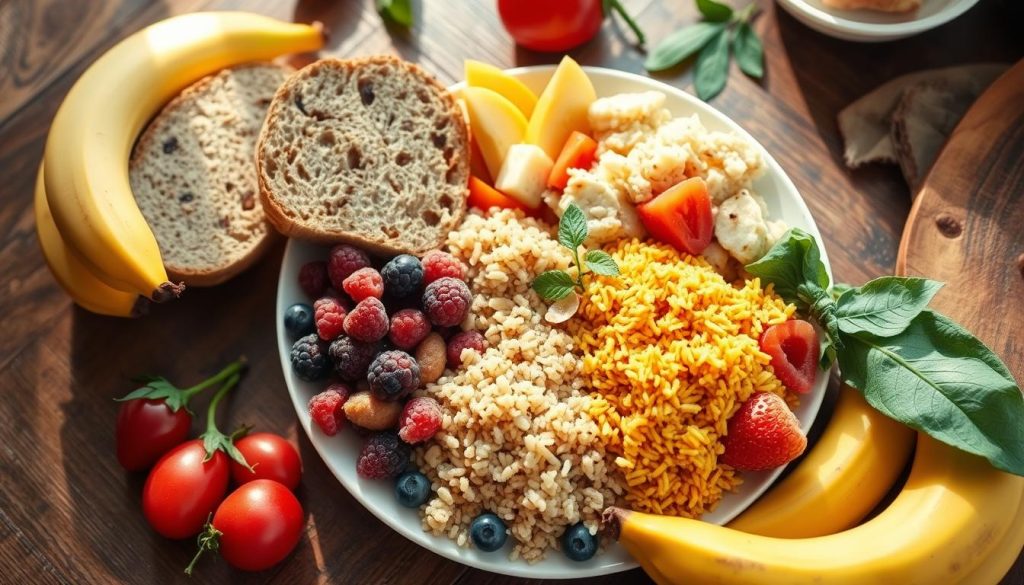
Carbohydrates often get a bad reputation, but they’re key for good health. They are the main energy source for our bodies. They help us move, exercise, and even think.
The right types and amounts are important for a balanced diet. Complex carbs in whole grains, legumes, and veggies give us energy and more. They’re full of fiber, vitamins, and minerals that keep our digestive system healthy and blood sugar stable.
These should be our top choice over refined carbs like white bread or sugary snacks.
“Embracing mindful eating practices and enjoying a variety of nutrient-dense foods, including carbohydrates, can promote a well-rounded approach to diet and nutrition.”
Remember, weight gain comes from eating too many calories, not just carbs. A balanced diet should have carbs, proteins, and fats in the right amounts. Your age, how active you are, and your health goals will affect how much carbs you need.
- Whole grains provide essential nutrients and sustained energy
- Fruits offer natural sugars along with vital vitamins and antioxidants
- Legumes deliver both carbohydrates and plant-based protein
By choosing whole foods and eating in moderation, carbs can be a great part of a healthy diet. Don’t believe the myth that all carbs are bad. They’re crucial for good health when eaten right.
The Role of Protein in a Balanced Diet
Protein is key to a balanced diet, helping with many body functions. The National Academy of Medicine says 10% to 35% of daily calories should be from protein. This shows how vital it is for our health.
Plant vs. Animal Protein Sources
Both plants and animals offer enough protein. Animal proteins have all 20 amino acids the body needs, making them complete. For example, a 6-ounce salmon piece has 34g of protein.
Plant-based foods also have all essential amino acids. They work well for building muscle, just like animal proteins.
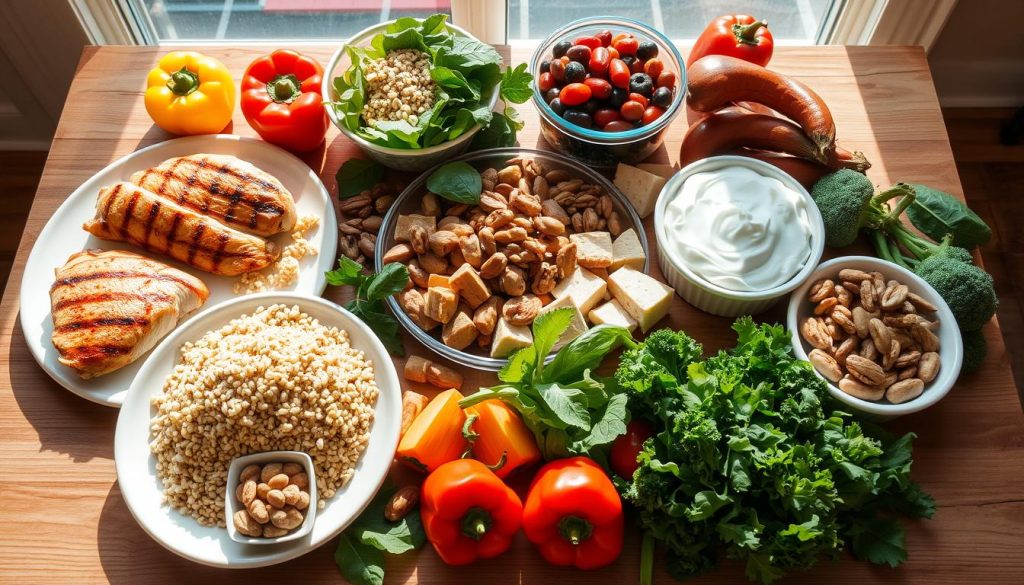
Protein Requirements for Different Lifestyles
How much protein you need changes with age, activity, and health. Teenagers need 52g of protein a day, boys and girls differently. Adults should aim for 0.8 grams per kilogram of body weight.
Teen athletes might need more because they’re more active.
Dispelling Myths About Protein Consumption
Many think too much protein is bad, but it’s not true. Eating more plant proteins like beans, nuts, or soy can lower heart disease risk. A diet rich in whole foods is best for getting all the nutrients you need.
| Protein Source | Protein Content (g) | Health Benefits |
|---|---|---|
| Salmon (6 oz) | 34 | Heart health, omega-3 fatty acids |
| Beans (1 cup) | 15 | Fiber, antioxidants, lower risk of chronic diseases |
| Nuts (1 oz) | 6 | Healthy fats, vitamins, minerals |
| Soy (1 cup) | 22 | Complete protein, may lower cholesterol |
Debunking Popular Weight Loss Strategies
Many people think losing weight means joining a gym, but that’s not always the case. Everyday activities can help a lot with weight loss. It’s about making small changes every day.
Fad diets promise fast weight loss but often lead to gaining it back. This cycle is bad for your health. Instead, focus on eating well for the long run.
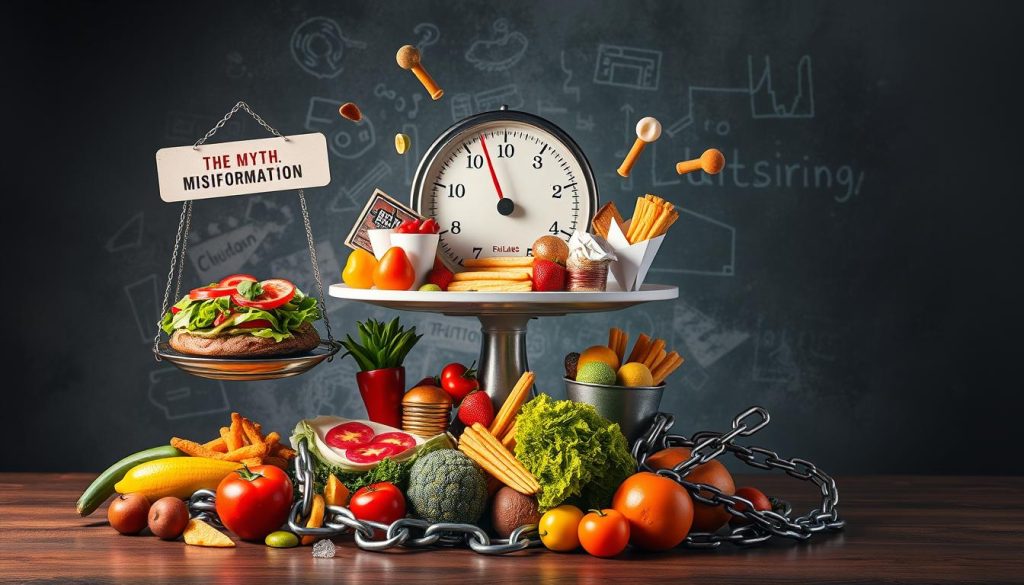
Age doesn’t stop you from losing weight. With time and effort, you can reach your goals at any age. It’s about making changes that last, not quick fixes.
Some think you have to give up your favorite foods to lose weight. But, it’s all about balance. You can still enjoy treats while losing weight.
“Healthy eating isn’t about strict limitations, but about feeling great, having more energy, and keeping yourself as healthy as possible.”
Be careful with weight loss supplements. Most don’t work well and some can be dangerous. Stick with eating right and staying active.
| Weight Loss Myth | Reality |
|---|---|
| Gym membership is necessary | Everyday activities can contribute significantly |
| Fad diets are effective | Often lead to unhealthy yo-yo dieting |
| Age limits weight loss | Possible at any age with patience and consistency |
| Must give up favorite foods | Moderation allows enjoyment while losing weight |
| Supplements are effective | Lack scientific evidence, some can be harmful |
The Impact of Meal Timing on Health
Meal timing is a big topic in nutrition advice. Many people have questions about it. Let’s look into some common beliefs and what’s true.
Breakfast: Is It Really the Most Important Meal?
Many think breakfast is key for staying healthy. But, studies say it’s not always the case. Skipping breakfast might help some adults eat fewer calories.
It could also make your body use fat for energy. Plus, it might increase growth hormone production.
Intermittent Fasting: Separating Fact from Fiction
Intermittent fasting is getting popular. Research shows it can help control blood sugar levels. But, fasting for more than 30 hours might slow down your metabolism.
Nighttime Eating and Metabolism
Some think eating at night makes you gain weight. But, studies say eating carbs at night might actually help with losing fat. It seems the timing of when you eat isn’t as important as the quality and amount of your diet.
| Meal Timing Myth | Reality |
|---|---|
| Eating frequent small meals boosts metabolism | Meal frequency has no significant impact on metabolic rate |
| Avoid eating at night to lose weight | Eating majority of calories at dinner can maintain similar body composition as eating earlier |
| Post-workout protein shake is crucial | No significant difference in body composition changes between immediate and delayed protein intake |
While meal timing is important for health, it’s not everything. Focus on the quality of your diet, how much you eat, and what works for you. This will help you get the best results.
Nutrition Myths: What’s True and What’s Not
Nutrition myths often confuse us about what’s healthy to eat. Let’s look at some common myths and find out what’s really true. This will help you make better food choices.
Many think fresh produce is always better than frozen or canned. But, frozen fruits and veggies can be just as nutritious. They’re picked when ripe and frozen quickly, saving their nutrients. Eating a lot of fruits and veggies, no matter the form, can lead to a longer life and lower death risk.
Carbs get a bad rap, but not all are bad. Whole grains, fruits, and veggies have important complex carbs. These carbs take longer to break down in our bodies. This helps with weight control, better digestion, and lowers the risk of chronic diseases.
- Choose products labeled “100% whole grain” for guaranteed whole grain content
- Opt for complex carbs over refined ones for better health benefits
- Remember, carbohydrates are the body’s main source of energy
Crash diets might seem like a quick way to lose weight, but they’re not good for you in the long run. They can lead to not getting enough nutrients and health problems. Weight lost on crash diets usually comes back after you start eating normally again. Instead, aim for lasting changes in your diet and lifestyle.
“The Mediterranean diet, which focuses on plant-based foods, has proven positive cardiovascular health outcomes and is anti-inflammatory,” says Julia Zumpano, a Cleveland Clinic dietitian specializing in preventive cardiology.
For good nutrition advice, look to trusted sources like government health departments, professional health groups, and registered dietitians. Be careful of sources that make big claims without proof. Getting advice from experts can help clear up myths, support your health, and improve your well-being.
The Truth About Supplements and Micronutrients
Nutrition advice often talks about supplements and micronutrients. A balanced diet should give you all the nutrients you need. But, many Americans don’t get enough. Only 9% of us eat the daily recommended servings of vegetables, which are key for micronutrients.
The dietary supplement industry is worth about $19 billion a year. Multivitamins are the top choice, with 40% of U.S. adults taking them often. But do we really need them?
Experts say taking high doses of vitamins can be a waste or even dangerous. But, some groups might need certain supplements:
- Adults over 50 need 1,200 mg of calcium daily for bone health
- Pregnant women often require extra nutrients
- People with dark skin or limited sun exposure may need vitamin D supplements
Remember, supplements don’t take the place of a healthy diet. They should add to, not replace, foods full of nutrients. Whole foods give you complex benefits that supplements can’t.
“Let food be thy medicine and medicine be thy food.” – Hippocrates
Before starting supplements, talk to a healthcare provider. They can figure out what nutrients you need based on your diet, lifestyle, and health. The aim is to fill nutritional gaps, not spend a lot on urine.
Navigating Diet Trends and Fads
Fad diets promise quick weight loss but don’t always work well over time. It’s important to understand nutrition myths and check out popular diets before making health choices.
Evaluating Popular Diets
The ketogenic diet, intermittent fasting, and detox diets are big topics. They might help in the short term, but their long-term effects can be different. A study in 2016 showed that low-carb diets led to more weight loss and better heart health than low-fat diets.
Long-term Sustainability of Trendy Diets
For lasting weight loss, aim to lose 1-2 pounds a week. This means eating 500-1,000 fewer calories a day through diet and exercise. Diets that cut calories too much can lead to gaining back the weight lost.
Personalized Nutrition Approaches
Not all diets work for everyone. A diet should fit your genes, lifestyle, and health. For instance, a ketogenic diet might help some people with certain health issues but not others.
| Diet Type | Potential Benefits | Potential Risks |
|---|---|---|
| Ketogenic | Weight loss, improved cardiovascular markers | Ketoacidosis, kidney issues |
| Intermittent Fasting | Weight loss, metabolic health improvements | Hunger, irritability |
| Detox Diets | Short-term weight loss | Nutrient deficiencies, fatigue |
The best diet is one you can follow for a long time. Talk to a healthcare expert before starting a new diet.
Understanding Food Labels and Marketing Claims
Food labels and marketing claims can be confusing. Many people get misled when they shop. The FDA requires Nutrition Facts labels to help with healthy eating.
Food companies use smart tricks. They might show smaller serving sizes, making calories look lower. For example, a small bag of trail mix might list 100 calories per serving. But, it could actually have 3 servings, so that’s 300 calories if you eat the whole thing. Sugar also has many names, like beet sugar or fruit juice concentrate, hiding its real amount.
Don’t trust terms like “organic,” “gluten-free,” or “low-fat.” These terms follow FDA rules but don’t always mean the food is healthier. For instance, “low-fat” foods can still be high in sugar. The best choice? Go for whole foods and plant-based options. By understanding food labels and nutritional guidelines, you can make better choices for a balanced diet.
FAQ
Are all fats bad for you?
No, not all fats are unhealthy. Healthy fats from sources like avocados, nuts, and olive oil are good for you. They give you essential nutrients and help with your health.
Should I avoid grains to lose weight?
No, whole grains are key for a healthy diet and can help with weight loss. They offer fiber and iron. Choose whole grains over refined ones and watch your portion sizes.
Can vegans and vegetarians get enough protein?
Yes, vegans and vegetarians can get enough protein with foods like legumes, nuts, and soy products. It’s important to eat a variety of these foods to get all the nutrients you need.
Do I have to give up my favorite foods to lose weight?
No, you don’t have to give up your favorite foods. Just eat them in moderation. Balance your calorie intake and expenditure to lose weight while still enjoying your favorite treats.
Is breakfast really the most important meal of the day?
Not necessarily. Some research says skipping breakfast might not be bad for adults and could help with calorie control. What’s more important is the quality and amount of your diet, not just when you eat.
Are fresh produce always healthier than frozen or canned options?
No, frozen and canned produce can be as nutritious as fresh. They’re often easier to get and can reduce food waste. Choose low-sodium or no-salt-added canned goods when you can.
Do I need to take supplements if I eat a healthy diet?
Not necessarily. Supplements can fill nutritional gaps, but a balanced diet should give you most of what you need. Talk to a healthcare professional before taking supplements, especially if you have dietary restrictions or health conditions.
Are all trendy diets effective for weight loss?
No, not all popular diets are proven or good for your health in the long run. Look for diets that are based on science, flexible, and fit your lifestyle and needs.
What do food labels like “natural” and “low-fat” really mean?
Labels like “natural” and “low-fat” can be confusing. Always check the nutrition facts and ingredient lists to see what’s really in the food. Don’t just trust marketing terms, focus on the food’s real nutritional value and quality.


